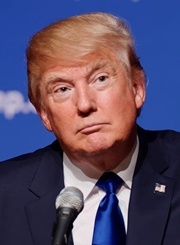Judges face threats after denying Trump’s travel ban appeal
10 Feb 2017
 Judges involved in the legal challenges to President Donald Trump's executive order on immigration have reportedly faced threats, after they denied the Trump administration's appeal against a temporary suspension of his travel ban.
Judges involved in the legal challenges to President Donald Trump's executive order on immigration have reportedly faced threats, after they denied the Trump administration's appeal against a temporary suspension of his travel ban.
News agencies report federal and local law enforcement agencies have temporarily increased security protection for the judges who denied Trump's appeal. The threats come as Trump continues to verbally criticise the judges over their initial decision to suspend the ban.
The President first took a swipe at Judge James L Robart, who halted the executive order pending appeal in the first place, referring to him as a ''so-called judge''.
He later suggested Robart's decision was an affront to the country's national security.
He criticised the judges directly in a speech given Wednesday to the National Association of Sheriffs.
''I don't ever want to call a court biased and we haven't had a decision yet. But courts seem to be so political, and it would be so great for our justice system if they would be able to read a statement and do what's right,'' Trump said.
He said, ''I will not comment on the statements made by certainly one judge, but I have to be honest that if these judges wanted to, in my opinion, help the court in terms of respect for the court, they'd do what they should be doing. It's so sad.''
Today the appeals panel said the government presented no evidence to explain the urgent need for the executive order to take effect immediately.
''To rule on the government's motion, we must consider several factors, including whether the government has shown that it is likely to succeed on the merits of its appeal, the degree of hardship caused by a stay or its denial, and the public interest in granting or denying a stay,'' the court order stated.
''We assess those factors in light of the limited evidence put forward by both parties at this very preliminary stage and are mindful that our analysis of the hardships and public interest in this case involves particularly sensitive and weighty concerns on both sides.
''Nevertheless, we hold that the government has not shown a likelihood of success on the merits of its appeal, nor has it shown that failure to enter a stay would cause irreparable injury, and we therefore deny its emergency motion for a stay.''
This means the travel ban is still in limbo. The government will now likely take its appeal to the Supreme Court, where the ban's legality will be decided.
Trump took to Twitter to make his thoughts on the ruling known.
''It's a political decision, we're going to see them in court, and I look forward to doing that,'' Trump told reporters in the White House. ''It's a decision that we'll win, in my opinion, very easily.''
Earlier, a panel of three judges from the 9th US Circuit Court of Appeals unanimously denied the Trump administration's appeal against a temporary suspension of the president's executive order.
The court rejected the administration's claim that it did not have the authority to review the president's executive order.
''There is no precedent to support this claimed unreviewability, which runs contrary to the fundamental structure of our constitutional democracy,'' the court said.
''Rather than present evidence to explain the need for the executive order, the government has taken the position that we must not review its decision at all. We disagree, as explained above.''
Trump's executive order temporarily suspended America's refugee programme and immigration from seven majority-Muslim countries that have raised terrorism concerns, including Iraq, Iran, Sudan, Libya, Somalia, Yemen and Syria (See: Trump suspends all refugee admissions; to favour Christians). His decree slapped a blanket ban on nationals for 90 days and barred all refugees for 120 days. Refugees from Syria were blocked indefinitely.
US District Judge James Robart in Seattle issued a temporary order halting the ban last week after two states, Washington and Minnesota, sued (US judge puts Trump's visa ban on hold after states' challenge). Justice Department lawyers appealed to the 9th Circuit, arguing that the president has the constitutional power to restrict entry to the United States and that the courts cannot second-guess his determination that such a step was needed to prevent terrorism.
Each side had half an hour to defend their positions, with the judges asking tough questions throughout.
During the hearing the judges expressed scepticism over the need for the travel ban that covers seven predominantly Muslim countries, but also downplayed the importance of public comments that suggested the ban targeted Muslims.

















